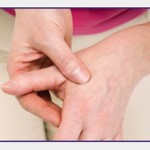Dr. Macaden squats down for a closer look, and I sit awkwardly, shifting unwilling knees in search of a comfortable position. The two nurses speak softly to Maria and her mother in the region’s lilting Kannada tongue. “Our drive was pleasant. The fields look healthy. This is Dr. Macaden, whom you know. This is the American doctor. He is a specialist in arthritis and wants to help you.”
The mother considers this as she runs a comb through her daughter’s hair, humming softly. Then she reaches back into the shadows and hands a plastic bag to the nurses. One nurse empties the contents onto the mat, separates the pills into small piles, counts them and asks about effectiveness and side effects, while the other tallies the results in a notebook.
The older nurse asks, “Mother, do you give Maria this pill only once each week?” The mother nods solemnly. She explains that the mailman comes to the village once each week, and it is on this day she gives the special pill to Maria with a glass of water.
I recognize the methotrexate, diclofenac, cimetidine and a 10 mg tablet of prednisone and point to an unknown pill. Dr. Macaden whispers to me, “The pink pill is for depression.”
Then, “Mother, do you give Maria the pink pill? Does she cry less?”
“Yes, I give her the special pill. Can you make it stronger? She still cries, but not all day.”
“And how is her pain,” Dr. Macaden asks.
“The pain is very bad,” the mother says.
“Maria,” Dr. Macaden places his hand lightly on her forehead. “How is your pain? Does the medication help with pain?” In a faint, hoarse whisper, Maria answers, “No. The pain is always with me, even when I sleep. I dream about the pain.”
Dr. Macaden explains to me in English, “She is on morphine. It’s a low dose, but it’s not helping. She says the pain is no different. Perhaps you can take a look.”
My Examination
A nurse asks Maria if I can examine her hands. I move closer, and she groans as I cradle her hand in my palm. The fingers overlap and droop in partial flexion, drifting uselessly away from the thumb. She cannot extend her fingers or pinch between her thumb and index finger. It’s clear that she is unable to hold a glass or use a spoon. Her elbows are in a fully flexed state, the shoulders nearly immobile. Maria holds her arms crossed over her chest like a living sarcophagus. When I attempt to straighten her elbows or range her shoulders, there is an audible clunk, and she cries out and begins to sob.


